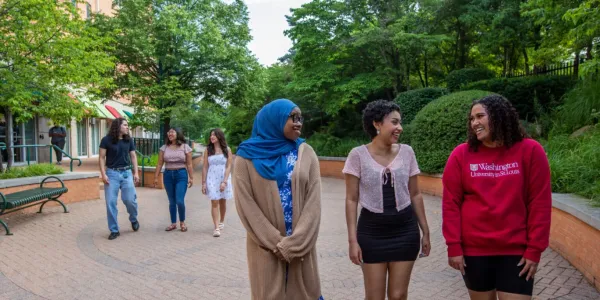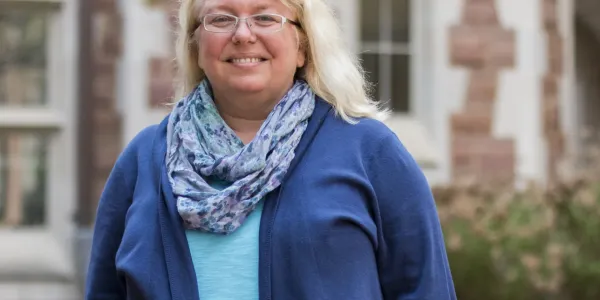As dean’s fellow, Brett Wick looks forward to fostering connections and collaborations among faculty working in digital transformation and helping to build the new Department of Statistics and Data Science in Arts & Sciences.
Harnessing the power of data sciences, digital transformation, and advanced technologies is a pillar of the Arts & Sciences Strategic Plan. As the Dean’s Fellow for Digital Transformation, Brett Wick, who is also a professor of mathematics and statistics, is focused on helping to build the structural foundations that will support cutting-edge research in data science and digital innovation in Arts & Sciences.

“We’re building intense momentum in these areas, both within Arts & Sciences and across Washington University, because they have the power to transform discovery and education, ” said Feng Sheng Hu, dean of Arts & Sciences. “I’m very pleased to have Professor Wick as a partner in leveraging this momentum – including the incredible expertise we’re building – for the benefit of our school, our students, and, ultimately, our society.”
Since taking on the role of dean’s fellow this fall, Wick has been making strides in two major projects: fostering connections and eventual collaborations among faculty engaged in the Digital Transformation Initiative and supporting the creation of the new Department of Statistics and Data Science.
The Digital Transformation Initiative launched in spring 2021 with the aim of bolstering Arts & Sciences’ capabilities in data analytics and digital technologies by hiring interdisciplinary scholars with expertise in digital, spatial, and data sciences. The initiative brought 19 new faculty to WashU in departments across Arts & Sciences. Now, Wick is organizing programming, including the upcoming Digital Transformation Research Symposium, to facilitate connections among these new faculty hires as well as with established faculty working in computational and data science across the university.
“The whole is greater than the sum of the parts,” Wick noted. “We have all these incredible faculty members who share common interests and are working on similar problems, but they’re in different disciplines and use different terminology to speak about their work. One of my main goals as dean’s fellow this year is to bring these scholars together to interact and exchange ideas across disciplines.”
At the research symposium in early December, faculty will be grouped thematically and invited to share their work and discuss how they interface with data science and digital transformation. “The hope is that by having faculty speak about what they care about from a digital transformation point of view, they’ll find common points for starting scholarly discussions, which will hopefully lead to collaborative future work,” Wick said.
In addition to supporting current faculty, Wick is involved in the creation of Arts & Sciences’ Department of Statistics and Data Science. This new department will provide a foundation for ambitious and innovative research across a range of disciplinary areas, leveraging emerging opportunities in computational and data science and providing foundational data science support to schools and programs across the university.
Much like the efforts to facilitate faculty connections and foster the growth of scholarly production across disciplines, the compelling vision behind the new department is expansive, with connections and impacts throughout WashU.
“Right now, we’re searching for a chair to help launch this new department and set it on the right course. Dean Hu’s vision is to create a distinctive department, one that takes advantage of WashU’s strengths and leverages the unique attributes of Arts & Sciences,” Wick said. “Since data science and statistics touch on lots of different areas – from machine learning in engineering, to data analytics in business, to myriad applications in medicine – we’re looking for someone who is excited about leading and collaborating with a broad group of scholars.”
“This is an amazing opportunity,” Wick added. “WashU is a great place to carry out cutting-edge research in data science and related fields, and we’re at a pivotal moment where we can effect enormous change and impact the future of Arts & Sciences and the university as a whole.”





